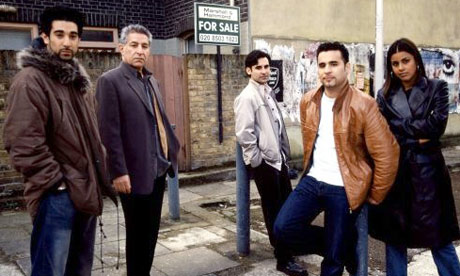Too many black and Asian faces on TV, says BBC director Samir Shah
Leigh Holmwood

EastEnders: Shah criticised the fact that the Ferreira family was of Goan, rather than Bangladeshi, descent. Photograph: BBC
Broadcasters have overcompensated for their lack of executives from ethnic minorities by putting too many black and Asian faces on screen, a leading television industry figure said last night.
Samir Shah, a member of the BBC's board of directors, said this had led to a "world of deracinated coloured people flickering across our screens - to the irritation of many viewers and the embarrassment of the very people such actions are meant to appease".
Shah, a former BBC head of current affairs who now runs an independent production company, Juniper, as well as being a non-executive director of the corporation, used a speech to the Royal Television Society to call for current TV industry diversity policies to be ditched because they were not working.
In an echo of the speech earlier this year by comedian Lenny Henry, who bemoaned the lack of diversity in British broadcasting, Shah said UK television had to go back to the drawing board to increase the number of black and Asian executives.
Speaking to an audience of television insiders, Shah said: "The difficult truth I want you to accept is this: the equal opportunity policies we have followed over the last 30 years simply have not worked.
"Despite 30 years of trying, the upper reaches of our industry, the positions of real creative power in British broadcasting, are still controlled by a metropolitan, largely liberal, white, middle-class, cultural elite - and, until recently, largely male and largely Oxbridge.
"The fine intentions of equal opportunities - and they are fine intentions - have produced a forest of initiatives, schemes and action plans. But they have not resulted in real change.
"The result has been a growing resentment and irritation at the straitjacket on freedom such policies impose and, paradoxically, the occasionally embarrassing over-compensation in an effort to do the right thing."
Shah said that instead of dealing with the issues surrounding why greater numbers of people from ethnic minorities had not made it to the executive level of British television, broadcasters had instead put more black and Asian faces on screen, regardless of whether they were cultural fits to the programmes they were in.
"I don't think that such over-representation is a brilliant idea. Another thing that's not real is some of the casting of non-whites in fiction," he added.
He pointed to the casting of the Ferreira family in EastEnders as an example. "If you were to cast an Asian family in the East End, it should have been Bangladeshi. Instead we had a family of Goan descent," Shah said.
"The plain fact is that this tick-box approach to equal opportunities has led to an inauthentic representation of who we are: a world of deracinated coloured people flickering across our screens - to the irritation of many viewers and the embarrassment of the very people such actions are meant to appease."
Shah said the reason there were so few executives from ethnic minority backgrounds in broadcasting was not because of institutional racism, but because managers liked to "clone" themselves when picking other senior staff.
"The search for comfort can take precedence over the search for the best, because cultural cloning carries no immediate cost," he added.
Shah said that when recruiting new senior staff, managers should think about the diversity of their team.
He added if he had a "magic wand", he would "make it incumbent on every major broadcaster and producer in the UK that, within five years, they need to demonstrate that their team of executives with real power over airtime or commissioning budgets come from a variety of different backgrounds, life experiences and ethnicity".
Shah said that if the UK TV industry did not change, then further regulation might force reform upon it.
"If you want to avoid that happening, then maybe the industry ought to start taking really seriously the need to tackle institutional cloning," he added.
"We urgently need to break the cultural hegemony that has dominated broadcasting in Britain if we are to tap into, and not lose, the creativity among all our people. It's time to force the change, before the change is forced upon you."
· To contact the MediaGuardian news desk email editor@mediaguardia n.co.uk or phone 020 7239 9857. For all other inquiries please call the main Guardian switchboard on 020 7278 2332.
· If you are writing a comment for publication, please mark clearly "for publication
Thursday June 26, 2008
The Guardian
http://www.guardian .co.uk/media/ 2008/jun/ 26/bbc.televisio n
Not happy with your email address?
Get the one you really want - millions of new email addresses available now at Yahoo!
Change settings via the Web (Yahoo! ID required)
Change settings via email: Switch delivery to Daily Digest | Switch format to Traditional
Visit Your Group | Yahoo! Groups Terms of Use | Unsubscribe
__,_._,___


